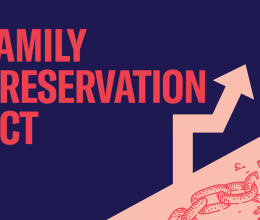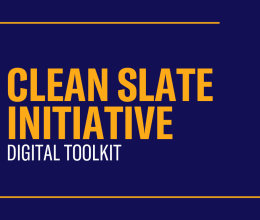
Jayden Spence was just five years old when he was awakened by police in his home. He was in his mom’s bed with his five-month-old brother, and the police were there to arrest his mother. He remembers how his life and his brother’s remained in a constant state of uncertainty from that day forward, with ever-changing routines and a perpetual void where his mother should have been.
Jayden recalls his disrupted family dynamic, and how he shifted from anger and sadness, to longing, to bitterness and resentment. Where he grew up in Eastern Kentucky, Jayden had many friends in similar situations – living with grandparents, in foster care, or home with parents who struggled with substance use or mental health disorders. These families were caught in a cycle of incarceration and release, but didn’t have access to the treatment and community support they needed.
Jayden’s mom, Amanda Hall, remembers her mother’s incarceration as well. She was around seven years old and can still picture the newspaper on her teacher’s desk with an article describing her mom’s arrest. Even though her mother wasn’t imprisoned for long, the damage was done. The next years were filled with uncertainty, mistrust, and the constant undercurrent of trauma passed from parent to child.
Amanda holds deep love and respect for her mother. As an advocate for changes to our country’s criminal legal system, she knows her mother was a survivor who was never able to access the tools she needed to succeed. The intimate partner violence, mental health issues, and unresolved trauma Amanda’s mom suffered were part of a cycle of generational trauma – one that is incredibly common in Kentucky.
Kentucky has the 2nd highest rate of kids with incarcerated parents in the nation. Annie E. Casey Foundation reports 12% of Kentucky kids have had a parent who has experienced incarceration. This deeply impacts a child’s formative years, and it's included as a question in the Adverse Childhood Experiences (ACE) screening tool. The questionnaire is designed to measure trauma's impact on health. Outside of the relationship between a high ACE score and negative health outcomes (both physical and mental), study after study demonstrates the severe negative effects of an incarcerated parent on a child.
Nationally, nearly half of all incarcerated people are parents to minor children. The proportions are higher when it comes to Kentucky, with 64% of women and 55% of men incarcerated by the state who parent minor children. Children of women who are incarcerated are five times more likely to end up in foster care than children of men who are incarcerated. Further, women who are primary caretakers and are incarcerated also have their parental rights taken away most often. These numbers are especially concerning given that moms are more likely to be primary caregivers to children and Kentucky incarcerates women at some of the highest rates in the nation.
Kentucky has already advanced policies and initiatives to support the preservation of families. We have seen it through the advancement of bills to provide modest accommodations for pregnant people incarcerated in jails and significant investment in treatment services. We’ve seen it in bills that provide for new parents and offer post-natal support.
Some states have established legislative solutions for the impact of incarceration on families. Most of these laws create alternative sentencing options, allowing caregivers to avoid incarceration but not a criminal conviction, or create diversion programs for caregivers, or both. These measures are rising in popularity because laws and programs that help caregivers stay with their dependents produce better outcomes for everyone involved, including the community they live in, while saving the state valuable resources.
Being in prison was incredibly painful, Amanda recalls. Anyone who has experienced incarceration knows the experience is traumatic. But far more excruciating was being separated from her sons. After years of working through the pain of separation and disruption to their lives, Amanda and Jayden have a strong relationship based on mutual respect. But they can never get back the time they lost.
Kentuckians are known for their community spirit and desire to help their neighbors, and Amanda and Jayden want to see us work together to save families from feeling the agony they have endured. We are strongest when we work together to help Kentucky communities thrive.



